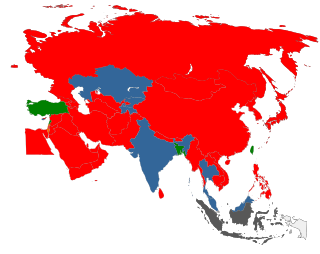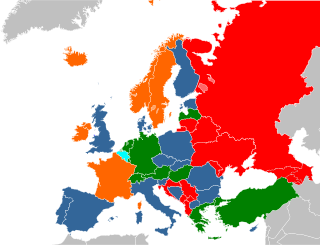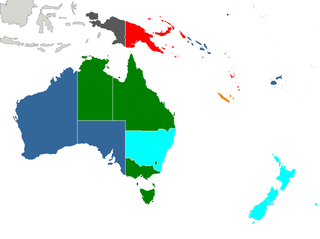Related Research Articles

Prostitution in the Netherlands is legal and regulated. Operating a brothel is also legal. De Wallen, the largest and best-known Red-light district in Amsterdam, is a destination for international sex tourism. From 1 January 2022, a customer will be punished if they purchase a sexual service from a sex worker of whom they know or have serious reason to suspect that there is coercion, exploitation or human trafficking.

In Great Britain, the act of engaging in sex as part of an exchange of sexual services for money is legal, but a number of related activities, including soliciting in a public place, kerb crawling, owning or managing a brothel, pimping and pandering, are crimes. In Northern Ireland, which previously had similar laws, paying for sex became illegal from 1 June 2015.
Prostitution in South Korea is illegal, but according to The Korea Women's Development Institute, the sex trade in Korea was estimated to amount to 14 trillion South Korean won in 2007, roughly 1.6% of the nation's gross domestic product. According to a survey conducted by the Department of Urology at the Korea University College of Medicine in 2015, 23.1% of males and 2.6% of females, aged 18–69, had sexual experience with a prostitute.

The legality of prostitution in Asia varies by country. There is often a significant difference in Asia between prostitution laws and the practice of prostitution. In 2011, the Asian Commission on AIDS estimated there were 10 million sex workers in Asia and 75 million male customers.
The laws on prostitution in Sweden make it illegal to buy sex, but not to sell the use of one's own body for such services. Procuring and operating a brothel remain illegal. The criminalisation of the purchase of sex, but not the selling of one's own body for sex, was unique when first enacted in Sweden in 1999. Since then, this "Nordic model" for sex trade legislation has been adopted in several other nations.
Prostitution in Iceland is thriving despite paying for sex being illegal.
Prostitution in Finland is legal, but soliciting in a public place and organised prostitution are illegal. According to a 2010 TAMPEP study, 69% of prostitutes working in Finland are migrants. As of 2009, there was little "visible" prostitution in Finland as it was mostly limited to private residences and nightclubs in larger metropolitan areas.
Prostitution in the Philippines is illegal, although somewhat tolerated, with law enforcement being rare with regards to sex workers. Penalties range up to life imprisonment for those involved in trafficking, which is covered by the Anti-Trafficking in Persons Act of 2003. Prostitution is available through bars, karaoke bars, massage parlors, brothels, street walkers, and escort services. Fallen Angels; The True Cost of sex Tourism in the Phillipines/2016
Prostitution in Ghana is illegal but widespread, so much so that many Ghanaians are unaware that it is prohibited. There are growing sex tourism, child prostitution and human trafficking. High rates of unemployment and poverty in Ghana are believed to be causing a drastic growth in the sex industry. Unemployment is a reason the teenage engage in sex trade. A high percentage of sex workers are vulnerable to HIV.

Prostitution is the business or practice of engaging in sexual activity in exchange for payment. The definition of "sexual activity" varies, and is often defined as an activity requiring physical contact with the customer. The requirement of physical contact also creates the risk of transferring diseases. Prostitution is sometimes described as sexual services, commercial sex or, colloquially, hooking. It is sometimes referred to euphemistically as "the world's oldest profession" in the English-speaking world. A person who works in this field is called a prostitute, or more inclusively, a sex worker.

Prostitution in Pakistan is a taboo culture of sex-trade that exists as an open secret but illegal. Prostitution is largely based in organisational setups like brothels or furthered by individual call girls.

The legality of prostitution in Europe varies by country.
This is an overview of prostitution by region.

The legal status of prostitution in Africa varies widely. It is frequently common in practice, partially driven by the widespread poverty in many sub-Saharan African countries, and is one of the drivers for the prevalence of AIDS in Africa. Senegal and Côte d'Ivoire permit the operations of brothels. In other countries, prostitution may be legal, but brothels are not allowed to operate. In some countries where prostitution is illegal, the law is rarely enforced.
Prostitution in Northern Ireland is governed by the Human Trafficking and Exploitation Act 2015, which makes it illegal to pay for sex in Northern Ireland. Prior to the act coming into effect, prostitution in Northern Ireland was regulated by the same or similar laws to those in England and Wales, as it is elsewhere in the United Kingdom. At that time, prostitution in Northern Ireland was legal subject to a number of restraints which controlled certain activities associated with prostitution, such as soliciting, procuring, living on the proceeds of prostitution (pimping), exploitation of prostitutes, under-age prostitution, and keeping a brothel. However, devolution provided the opportunity for separate legislation in Northern Ireland.

Prostitution law varies widely from country to country, and between jurisdictions within a country. At one extreme, prostitution or sex work is legal in some places and regarded as a profession, while at the other extreme, it is a crime punishable by death in some other places.

Legality of prostitution in the Americas varies by country. In America it is Illegal, even though most seem to believe Las Vegas it is. Most countries only legalized prostitution, with the act of exchanging money for sexual services legal. The level of enforcement varies by country. One country, the United States, is unique as legality of prostitution is not the responsibility of the federal government, but rather state, territorial, and federal district's responsibility.

Prostitution in Oceania varies greatly across the region. In American Samoa, for instance, prostitution is illegal, whereas in New Zealand most aspects of the trade are decriminalised.

The Nordic model approach to prostitution, also known as the end demand, equality model, neo-abolitionism, partial decriminalization, and Swedish model, is an approach to prostitution law. It has been adopted in three of the five Nordic countries, but has no connection to the Nordic model, which is a socioeconomic model. Under the Nordic model, sex buyers are criminalized while prostitutes are decriminalized; typically, prostitutes can sell their own services but auxiliary procuration services, such as pimping, brothel-keeping, and third-party advertising remain illegal. The main objective of the model is to decrease the demand for prostitution by punishing the purchase of sexual services in order to decrease the volume of the illegal sex industry overall.
Clients of prostitutes or sex workers are sometimes known as johns or tricks in North America and punters in the British Isles. In common parlance among prostitutes as well as with others, the act of negotiating and then engaging with a client is referred to as turning a trick. Female clients are sometimes called janes, although the vast majority of prostitution clients are male in almost all countries.
References
- ↑ Greggor Christian Mattson (2008). Governing Loose Women: Rationalizing European Prostitution, 1998-2004. p. 187. ISBN 978-0549834755.
- ↑ Nicholas Kulish (October 5, 2007). "Bulgaria moves away from legalizing prostitution". The New York Times . Retrieved February 20, 2013.
- ↑ Karl Ritter (March 15, 2008). "Sweden's sex law: get the customer". USA Today . Retrieved February 20, 2013.
- ↑ "New twist to old game". Shanghai Star . April 10, 2003. Archived from the original on July 14, 2012. Retrieved February 20, 2013.
- ↑ Karl Ritter (March 16, 2008). "Sweden prostitution law attracts world interest". USA Today . Retrieved February 20, 2013.
- ↑ "Sweden wakes up to the "white slave trade"". The Local . January 15, 2005. Retrieved February 20, 2013.
- ↑ "Sweden's prostitution laws drawing foreign interest". Legalbrief Today. March 18, 2008. Retrieved February 20, 2013.
- ↑ Rosie DiManno (March 24, 2008). "Sweden's sex law tough on johns". Toronto Star . Retrieved February 20, 2013.
- ↑ Annie Brown (March 13, 2008). "Scotland's Sex Trade Fight Looks To Success Of Swedish Model". Daily Record . Retrieved February 20, 2013.
- ↑ Fulya Özerkan (November 1, 2009). "Swedish model could inspire Turkey to combat trafficking". Hürriyet Daily News . Retrieved February 20, 2013.